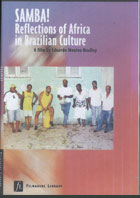
Samba! Reflections of Africa in Brazilian Culture 200?
Distributed by Filmakers Library, 124 East 40th Street, New York, NY 10016; 202-808-4980
Produced by Eduardo Montes-Bradley and The True Color of Music
Directed by Eduardo Montes-Bradley
DVD, color, 52 min.
Jr. High - Adult
Latin American Studies, South American Studies, Music, Popular Culture, Dance, Religious Studies
Date Entered: 07/13/2007
Reviewed by Martha Kelehan, Binghamton UniversityIn the early days of carnival, people who sang and danced samba were considered “low-lifes” and were routinely harassed by the police. Yet now samba is one of the most important and recognizable aspects of Brazilian culture. This documentary traces the African roots of samba, which is believed to get its name from the Angolan word for bellybutton, “semba.”
Samba is of course one of the most prominent symbols of Afro-Brazilian culture. Samba draws heavily from the music and dances of the terreiros, the Afro-Brazilian religious centers. The documentary highlights the importance of syncretism in Afro-Brazilian religions such as umbanda and candomblé, which draw from African religions as well as Catholicism.
Interviews with musicians, a former Harmony Director of the Mangueira samba school, and the historian Haroldo Costa provide some historical context to the old days of samba, but the documentary does not really explore how samba grew to be the current face of carnival. The interviews could have been more tightly edited, and I would have liked to seen much more footage of actual samba performances be they in the terreiro, in the streets, or on stage. For a film about samba, there wasn’t nearly enough dancing, singing, or playing!
The film is well-shot with some great archival footage from carnival and excerpts from the classic film Orfeu Negro (Black Orpheus). Overall the production values are high, with the notable exception of the numerous typos and malapropisms in the English subtitles.
Recommended for those interested in Afro-Brazilian culture and religions, syncretism, carnival, and samba.